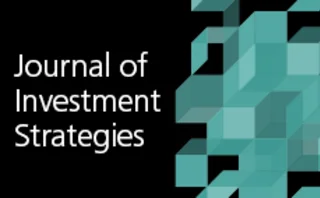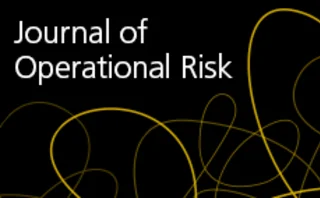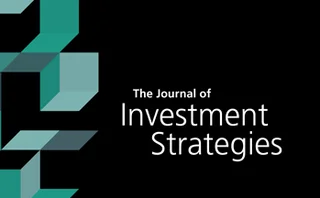Forum
The Kelly criterion in portfolio optimization: a decoupled problem
This paper examines how the Kelly criterion can be implemented into a portfolio optimization model that combines risk and return into a single objective function using a risk parameter.
Bridging networks, systems and controls frameworks for cybersecurity curriculums and standards development
This paper proposes a risk management framework designed to facilitate the alignment, integration and streamlining of professional practice standards and computer science/cybersecurity educational curriculums by bridging NPNATFs, SNIFs and RMCPFs.
Toward an efficient people-risk capital allocation for financial firms: evidence from US banks
In this paper, the authors address the issue of an efficient people-risk capital allocation for financial institutions.
A note on the standard measurement approach versus the loss distribution approach–advanced measurement approach: the dawning of a new regulation
This paper presents a nonexhaustive review of the literature on operational risk quantification under a combination of the loss distribution approach model – the most commonly used of the AMA models – and extreme value theory.
Leverage and uncertainty
By extending the Kelly criterion to a simple probabilistic model with an additional tail risk outcome associated with uncertainty, this paper looks beyond risk and evaluates how uncertainty constrains optimal leverage.
Central counterparty recovery and resolution: the European perspective
This paper contributes to the literature on the recovery and resolution of central counterparties (CCPs) by exploring the key components of the recent European legislative proposal on the recovery and resolution of CCPs, its main differences with the…
Reliability and agreement of credit ratings in the Mexican fixed-income market
This paper borrows concepts from measurement, test and psychometric theories to explore the issue of credit ratings in the Mexican corporate bond market.
The issues with the standardized measurement approach and a potential future direction for operational risk capital modeling
This paper discusses the criticism and praise the SMA and AMA have received, respectively, in many recent articles.
A balanced approach to central counterparty margining
This paper is meant to serve as a comparison of the approaches and margin models employed by CCPs.
A structural model for estimating losses associated with the mis-selling of retail banking products
In this paper, a structural model is presented for estimating losses associated with the mis-selling of retail banking products. It is the first paper to consider factor-based modeling for this operational/conduct risk scenario.
Standardized measurement approach: is comparability attainable?
This paper considers the claim of improved comparability of SMA outcomes by considering the ability to compare “internal loss experience” between banks.
Operational risk and the three lines of defence in UK financial institutions: is three really the magic number?
This paper examines the three lines of defence in the context of ORM in UK financial institutions.
I want security: stylized facts about central counterparty collateral and its systemic context
In this paper, the authors introduce the principal policy issues affecting CCPs and collateral and then use these disclosures to contextualize some stylized facts that may aid in understanding and addressing the policy issues.
The death of one thousand flowers or the AMA reborn?
The author of this paper explores the reasons for the pending demise of the advanced measurement approach (AMA) to operational risk.
Collateral flows and balance sheet(s) space
This paper looks at securities-lending, derivatives and prime-brokerage markets as suppliers of collateral.
Fractional Kelly strategies with low-risk stocks
This paper uses the fractional Kelly strategies framework to show that optimal portfolios with low-beta stocks generate higher median wealth and lower intra-horizon shortfall risk.
Not all payments are created equal: segmenting the payment landscape
This paper provides a broad perspective by taking into account payments globally in a comprehensive way: from card payments to real-time gross settlement
The challenges of derivatives central counterparty interoperability arrangements
This paper stuides a relevant policy question: does interoperability of cash equity CCPs also imply that it is beneficial to introduce interoperability for derivative CCPs?
Bank fraud and the macroeconomy
This paper empirically tests for correlations between fraud and the macroeconomy.
“Incomplete demutualization” and financial market infrastructure: central counterparty ownership and governance after the crisis of 2008–9
This paper examines risk management governance challenges of the demutualized CCP ownership model and the incentives faced by “incomplete demutualization”, where clearing members remain the ultimate underwriters of CCP default risk.
Performance versus turnover: a story by 4000 alphas
This paper analyzes empirical data for 4000 real-life trading portfolios with holding periods of about 0.7-19 trading days.
Central counterparties in crisis: International Commodities Clearing House, New Zealand Futures and Options Exchange and the Stephen Francis Affair
This paper highlights the vulnerability of CCPs to large concentrated positions that may be difficult or impossible to close out.
Central counterparties in crisis: the Hong Kong Futures Exchange in the crash of 1987
This Forum contribution shows the reader the lessons that can be learned from one of the few occasions in history when a CCP got into severe difficulty.






